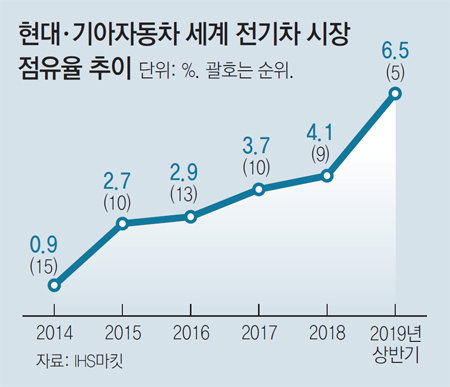Hyundai Motor Group ranks fifth in global EV market
Hyundai Motor Group ranks fifth in global EV market
Posted September. 10, 2019 07:40,
Updated September. 10, 2019 07:40

Hyundai Motor and its affiliate Kia Motors have ranked fifth in the global electric vehicle (EV) market, up four spots from last year on the back of robust sales of their eco-friendly models in Europe. The automakers are expected to further grow its share in the market with its investment in the largest EV charging joint venture of Europe.
Industry tracker IHS Markit said Monday that Hyundai and Kia took a 6.5 percent market share in the first half of the year, a 2.4 percentage point increase from last year, trailing Tesla of the United States), BYD of China, Renault-Nissan of France-Japan, and Shanghai Automotive Industry Corporation of China. The South Korean group’s EV sales more than doubled from the previous year to around 45,000 units.
What buoyed the South Korean carmakers’ sales was the growing popularity of EVs in Europe. Hyundai and Kia sold some 23,000 units in Europe alone in the first half of the year, with the electric versions of their popular sport-utility vehicles (SUV) such as Hyundai’s Kona and Kia’s Niro introduced in the market. The figure more than tripled from the first half of 2018, when their sales amounted to only around 7,000 units. Hyundai and Kia are also expected to launch EV versions of the Hyundai Lafesta and the Kia KX3 in China to boost overseas sales.
“Europe, after China, is the biggest EV market where countries are seeking strict emissions regulations,” said an official at Hyundai Kia Automotive Group. “We’re taking actions in a bold manner as competition is fierce in the region.”
The Korean auto giant has already increased its investment in EV technologies in Europe. In May, the automotive group announced that it would invest about 100 billion won in Rimac Automobili, the Croatian high-performance EV components company.
The Korean automakers also revealed its plan on Monday to invest in Ionity, an EV charging joint venture based in Munich, Germany. The venture was founded in November 2017 by Daimler (Mercedes-Benz), BMW, Volkswagen, and Ford. Except these four carmakers, Hyundai and Kia will become the first to join the venture as a shareholder. The firms did not disclose details about the deal, but are expected to acquire a 20 percent stake in the venture as other partners. The latest investment is likely to help the Korean group expand its presence in the European market, since Ionity currently operates a network of some 140 EV charging stations with 350-kilowatt chargers installed across highways in 14 European countries. Ionity plans to install 400 high-speed charging stations in 24 countries across Europe by the end of 2020. Using Ionity’s chargers, electric cars will be able to travel over 100 kilometers on just a three-minute charge.
In the meantime, Hyundai Motor Group, on Monday, also signed an MOU with OCI, an energy and chemical company, to seek a project to recycle dead batteries of EVs for energy storage systems (ESS). Under the deal, the two sides will start a demonstration project at a commercial solar photovoltaic power station in North America.
warum@donga.com







